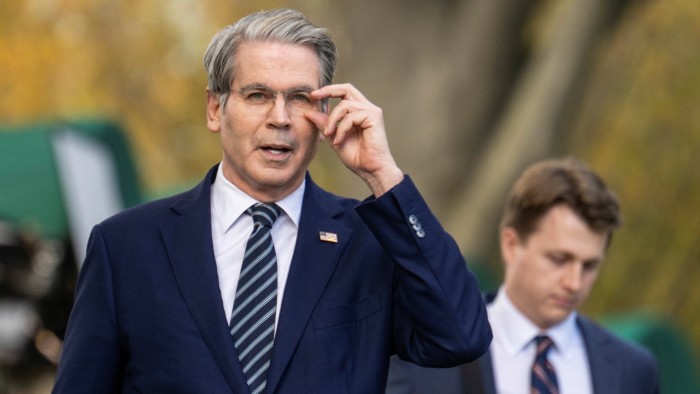Beijing “made a real mistake” by threatening to shut off exports of its rare earths, US Treasury secretary Scott Bessent has said, insisting the US would secure alternative supplies within two years.
Speaking after Donald Trump and Xi Jinping met in South Korea, Bessent told the FT that the US and Chinese leaders had reached an “equilibrium” but warned that China would not be able to keep using its critical minerals as a coercive tool.
“I don’t think they’re able to do it now because we have offsetting measures,” he said, adding that Chinese leverage over the US in rare earths would last no more than 12 to 24 months.
“China has alerted everyone to the danger. They’ve made a real mistake,” Bessent said. “It’s one thing to put the gun on the table. It’s another thing to fire shots in the air.”
The summit between Xi and Trump came six months after the leaders imposed extraordinary reciprocal tariffs that Bessent described at the time as tantamount to a trade embargo. After reaching a truce, tensions flared this month when China responded to new US export controls with sweeping controls on rare earths.
The move threatened the ceasefire and the first meeting between Trump and Xi since 2019, as well as causing widespread disruption around the world.
“I think the Chinese leadership were slightly alarmed by the global backlash to their export controls,” said Bessent.
Bessent held triage negotiations with Chinese vice-premier He Lifeng in Malaysia last week that salvaged the trade deal and the summit. “There’s an agreement that, ceteris paribus, we have reached an equilibrium, and we can operate within that equilibrium over the next 12 months,” said Bessent.
When the leaders sat across the table at Gimhae air base, Bessent said it was clear they respected each other. He said Xi voiced concerns, but clearly “wanted to find areas of co-operation with President Trump”.
“They were both looking forward to being in the room and moving things forward, rather than the choppy situation that we’ve been in since the spring,” Bessent said. “They realised that stability between the two countries is important, for both economies and for the global economy.”
He said one lighter moment occurred when they discussed Trump visiting Beijing. “President Trump said, ‘I believe you want me to come at the beginning of the year’, and President Xi said, ‘It’s very cold in January and February, why don’t we push it back to April?’”
Under the one-year deal, China agreed to postpone implementation of its rare earths regime, buy large amounts of US soyabeans and allow American investors to take control of TikTok in the US. Speaking about TikTok, Bessent said: “Everything’s ironed out in terms of the permissions, and we should see a transaction very soon.”
The US reciprocated by delaying a measure that would put thousands of Chinese groups on a trade blacklist. Trump also agreed to cut fentanyl-related tariffs from 20 to 10 per cent after Xi pledged to crack down on the export of chemicals used to make the deadly opioid.
“Fentanyl occupied a lot of the discussion in Busan,” Bessent said. “It is obviously very important for the president, very important for this administration, very important for the base and for all Americans.”
Some observers say the US and China have just paused hostilities and will struggle to make fundamental changes in relations.
Bessent disputed the idea that the US could no longer press China to undergo structural reforms to tackle issues such as overcapacity. He said he had warned the Europeans and others that Chinese exports would flow elsewhere after the US “put up the tariff wall”.
“The global south cannot absorb them, so for example they’re coming to the EU, the UK, Australia, Canada and Japan,” he said, adding that others had imposed tariffs on China or were planning to do so.
“We’ve set a standard, and I wouldn’t be surprised if the rest of the world doesn’t follow,” he said. “Our trade deficit with China is down 25 per cent this year. China’s manufacturing activity has now contracted for seven straight months. Maybe they will make the decision themselves.”
The Treasury secretary said Trump’s successful trip to Asia, including the deals he had done to make America the “leading destination for capital and investment” underscored a critical US advantage.
“The US has the world’s premier military, the strongest economy and financial centre with the dollar as the world’s reserve currency, and is the world’s leader in technology and innovation,” he said. “President Trump is cementing and expanding these strengths, and the Chinese know this.”
Bessent said the US and China would sign the deal over the coming week and was confident it would stick. “There will naturally be some bumps . . . but I think we have much better communication channels now.”
Source link









